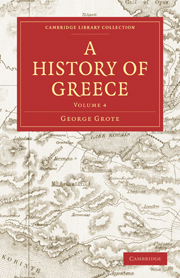Book contents
- Frontmatter
- Contents
- PART II CONTINUATION OF HISTORICAL GREECE
- CHAPTER XXV Illyrians, Macedonians, Pæonians
- CHAPTER XXVI Thracians and Greek Colonies in Thrace
- CHAPTER XXVII Kyrênê.—Barka.—Hesperides
- CHAPTER XXVIII Pan-Hellenic Festivals—Olympic, Pythian, Nemean and Isthmian
- CHAPTER XXIX Lyric Poetry.—The Seven Wise Men
- CHAPTER XXX Grecian Affairs during the Government of Peisistratus and his Sons at Athens
- CHAPTER XXXI Grecian Affairs after the Expulsion of the Peisistratids.—Revolution of Kleisthenês and Establishment of Democracy at Athens
- CHAPTER XXXII Rise of the Persian empire.—Cyrus
- CHAPTER XXXIII Growth of the Persian Empire
- CHAPTER XXXIV Dêmokêdês.—Darius invades Scythia
- CHAPTER XXXV Ionic Revolt
- CHAPTER XXXVI From Ionic Revolt to Battle of Marathon
- CHAPTER XXXVII Ionic Philosophers.—Pythagoras.—Kroton and Sybaris
- Titles in the Series
CHAPTER XXXIV - Dêmokêdês.—Darius invades Scythia
Published online by Cambridge University Press: 29 August 2010
- Frontmatter
- Contents
- PART II CONTINUATION OF HISTORICAL GREECE
- CHAPTER XXV Illyrians, Macedonians, Pæonians
- CHAPTER XXVI Thracians and Greek Colonies in Thrace
- CHAPTER XXVII Kyrênê.—Barka.—Hesperides
- CHAPTER XXVIII Pan-Hellenic Festivals—Olympic, Pythian, Nemean and Isthmian
- CHAPTER XXIX Lyric Poetry.—The Seven Wise Men
- CHAPTER XXX Grecian Affairs during the Government of Peisistratus and his Sons at Athens
- CHAPTER XXXI Grecian Affairs after the Expulsion of the Peisistratids.—Revolution of Kleisthenês and Establishment of Democracy at Athens
- CHAPTER XXXII Rise of the Persian empire.—Cyrus
- CHAPTER XXXIII Growth of the Persian Empire
- CHAPTER XXXIV Dêmokêdês.—Darius invades Scythia
- CHAPTER XXXV Ionic Revolt
- CHAPTER XXXVI From Ionic Revolt to Battle of Marathon
- CHAPTER XXXVII Ionic Philosophers.—Pythagoras.—Kroton and Sybaris
- Titles in the Series
Summary
Darius had now acquired full authority throughout the Persian empire, having put down the refractory satrap Orœtês, as well as the revolted Medes and Babylonians. He had moreover completed the conquest of Ionia, by the important addition of Samos; and his dominion thus comprised all Asia Minor with its neighbouring islands. But this was not sufficient for the ambition of a Persian king, next but one in succession to the great Cyrus. The conquering impulse was yet unabated among the Persians, who thought it incumbent upon their king, and whose king thought it incumbent upon himself, to extend the limits of the empire. Though not of the lineage of Cyrus, Darius had taken pains to connect himself with it by marriage: he had married Atossa and Artystonê, daughters of Cyrus—and Parmys, daughter of Smerdis the younger son of Cyrus. Atossa had been first the wife of her brother Kambysês; next, of the Magian Smerdis his successor; and thirdly of Darius, to whom she bore four children. Of those children the eldest was Xerxês, respecting whom more will be said hereafter.
Atossa, mother of the only Persian king who ever set foot in Greece—the Sultana Validi of Persia during the reign of Xerxês—was a person of commanding influence in the reign of her last husband, as well as in that of her son, and filled no inconsiderable space even in Grecian imagination, as we may see both by Æschylus and Herodotus.
- Type
- Chapter
- Information
- A History of Greece , pp. 338 - 375Publisher: Cambridge University PressPrint publication year: 2010First published in: 1847

